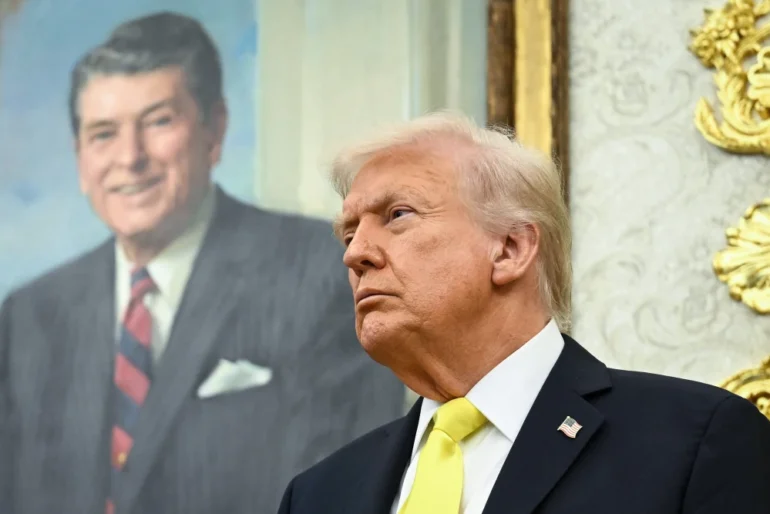In a dramatic escalation of U.S.-Canada trade tensions, President Donald Trump announced on Thursday that he is immediately terminating all negotiations with Canada. The decision, posted on his Truth Social platform, stems from a television advertisement aired by the Canadian province of Ontario, which features a critical speech by former President Ronald Reagan on tariffs.
Trump accused the ad of being a deliberate attempt to influence an upcoming U.S. Supreme Court case challenging the legality of his “reciprocal” tariffs. “They only did this to interfere with the decision of the U.S. Supreme Court, and other courts,” Trump wrote, referencing oral arguments set for November 5. These tariffs form a cornerstone of his foreign policy and economic strategy, imposing country-specific rates on imports to counter perceived unfair trade practices.
The advertisement, shared on X by Ontario Premier Doug Ford, repurposes a 1987 radio address Reagan delivered from Camp David, Maryland. In the clip, Reagan warns against protectionism: “When someone says, ‘Let’s impose tariffs on foreign imports,’ it looks like they’re doing the patriotic thing by protecting American products and jobs, and sometimes for a short while it works, but only for a short time.” He continues, “But over the long run, such trade barriers hurt every American worker and consumer. Then the worst happens, markets shrink and collapse, businesses and industries shut down, and millions of people lose their jobs.”
The ad wraps up with Reagan’s call for global prosperity: “Throughout the world, there’s a growing realization that the way to prosperity for all nations is rejecting protectionist legislation and promoting fair and free competition. America’s jobs and growth are at stake.”
Ontario timed the spot to air during Game 3 of the American League Championship Series between the Toronto Blue Jays and Seattle Mariners, broadcast on Fox Sports to an audience of over 9 million viewers. Neither Ford’s office nor Canadian Prime Minister Mark Carney’s team responded to requests for comment by press time.
The move has drawn sharp backlash from the Reagan Presidential Foundation and Institute, which issued a statement earlier Thursday condemning the ad’s use. “The ad misrepresents the Presidential Radio Address, and the Government of Ontario did not seek nor receive permission to use and edit the remarks,” the foundation said. It is now “reviewing its legal options” to address the unauthorized editing and broadcast.
This isn’t the first rupture in U.S.-Canada trade discussions under Trump. In June, he abruptly ended talks, blasting Canada’s policies on American tech firms and dairy farmers. Canada fired back with a steel quota, which Finance Minister François-Philippe Champagne decried as retaliation against “unjust U.S. tariffs.” Tensions eased briefly when Canada rescinded its digital services tax—a measure targeting U.S. giants like Google and Amazon—to smooth relations.
Prime Minister Carney’s early October White House visit appeared to mend fences. Standing beside Trump in the Oval Office, the president waxed poetic about the “mutual love” between the neighbors. Yet, he added a cautionary note: “We want Canada to do great. But you know, there’s a point at which we also want the same business.”
The stakes couldn’t be higher. Canada ranks as the United States’ third-largest source of imports, shipping over $410 billion in goods last year alone. Industries like automotive manufacturing rely heavily on cross-border supply chains, though the Trump administration has urged Detroit’s Big Three automakers—Ford, General Motors, and Stellantis—to reduce their dependence on Canadian parts and labor.
Trump’s latest salvo risks unraveling these vital ties just as winter looms, potentially hiking costs for everything from cars to lumber. With Supreme Court arguments approaching and Reagan’s words echoing across American screens, the ad’s timing feels less like coincidence and more like a calculated jab at Trump’s trade orthodoxy. As one analyst put it, this feud could turn the world’s longest undefended border into the hottest trade war front line yet.
For now, the ball—or puck—is in Canada’s court. Will Ottawa double down on free-trade advocacy, or seek a quiet truce? Only time, and perhaps another Oval Office handshake, will tell.
